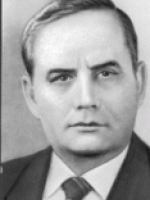Vladimir Ivashko facts for kids
Quick facts for kids
Vladimir Ivashko
|
|
|---|---|
| Владимир Ивашко (Russian) Володимир Івашко (Ukrainian) |
|
 |
|
| Acting General Secretary of the Communist Party of the Soviet Union |
|
| In office 24 August 1991 – 29 August 1991 |
|
| Preceded by | Mikhail Gorbachev |
| Succeeded by | Position abolished |
| Deputy General Secretary of the Communist Party of the Soviet Union |
|
| In office 12 July 1990 – 29 August 1991 |
|
| General Secretary | Mikhail Gorbachev |
| Preceded by | Yegor Ligachev |
| Succeeded by | Position abolished |
| First Secretary of the Communist Party of Ukraine | |
| In office 28 September 1989 – 22 June 1990 |
|
| Preceded by | Volodymyr Shcherbytsky |
| Succeeded by | Stanislav Hurenko |
| Chairman of the Supreme Soviet of the Ukrainian SSR | |
| In office 4 June 1990 – 9 July 1990 |
|
| Preceded by | Platon Kostiuk |
| Succeeded by | Leonid Kravchuk |
| Full member of the 27th, 28th Politburo | |
| In office 9 December 1989 – 29 August 1991 |
|
| Member of the 28th Secretariat | |
| In office 14 July 1990 – 29 August 1991 |
|
| Personal details | |
| Born | 28 October 1932 Poltava, Ukrainian SSR, Soviet Union |
| Died | 13 November 1994 (aged 62) Moscow, Russian Federation |
| Political party | Communist Party of the Soviet Union |
| Signature |  |
Vladimir Antonovich Ivashko (Russian: Влади́мир Анто́нович Ива́шко; Ukrainian: Володимир Антонович Івашко, Volodymyr Antonovych Ivashko) was an important Ukrainian politician from the Soviet Union. He was born on October 28, 1932, and passed away on November 13, 1994.
For a short time, from August 24 to August 29, 1991, he was the acting leader, or General Secretary, of the Communist Party of the Soviet Union (CPSU). This happened after Mikhail Gorbachev resigned. Just a few days later, the CPSU was stopped from operating by the government. Before this, Ivashko had been chosen as Gorbachev's Deputy General Secretary in the Party on July 12, 1990. This was a new position created during a big meeting of the Communist Party.
Contents
Early Life and Political Beginnings
Vladimir Ivashko was born in Poltava, a city in what was then the Ukrainian Soviet Socialist Republic. He grew up and became involved in politics during the time of the Soviet Union. He worked his way up through the ranks of the Communist Party.
Leading the Communist Party in Ukraine
In 1989, Mikhail Gorbachev, who was the top leader of the Soviet Union, asked Ivashko to become the First Secretary of the Communist Party of Ukraine. This was a very powerful position in Ukraine. Ivashko took on this role on September 28, 1989.
Under his leadership, the Communist Party won the first mostly free election in Ukraine in 1990. They won many seats in the parliament, called the Verkhovna Rada. Because the Communists had the most power, Ivashko was then chosen to be the Chairman of the Verkhovna Rada of the Ukrainian SSR on June 4, 1990. This job became the most important in Ukraine at that time.
Changes and New Roles
Ivashko decided to step down as First Secretary of the Communist Party of Ukraine on June 22, 1990. This was because some people were against him holding both the top party job and the top government job at the same time.
A short while later, on July 9, 1990, he also resigned as Chairman of the Verkhovna Rada. He did this because he was needed at a big meeting of the Communist Party in Moscow. At this meeting, he successfully became the Deputy General Secretary of the Communist Party of the Soviet Union. This meant he was now the second-in-command of the entire Soviet Communist Party.
Challenges for the Party
By July 1990, the Communist Party was facing many challenges. People felt it was losing its ability to lead the country. The party was also splitting into different groups. Some wanted their republics to be independent, while others wanted the Soviet Union to stay together. The party lost much of its power and unity. Real power was shifting to other leaders, like Gorbachev, who was President of the Soviet Union, and Boris Yeltsin, who was President of the Russian Republic.
During a difficult time in August 1991, when some leaders tried to take control from Gorbachev, Ivashko did not speak publicly. However, he sent letters to local party groups, asking them to support the Communist Party.
Ivashko also worked on plans to help manage the Communist Party's money. This was because Boris Yeltsin, the new president of the Russian Republic, wanted to tax the party's large properties and funds. Ivashko's plans aimed to protect the party's finances by moving them through different organizations.
End of an Era
After the attempt to take control from Gorbachev failed in August 1991, Gorbachev resigned from his position as General Secretary. This is when Vladimir Ivashko became the acting General Secretary for a few days.
However, on August 29, 1991, the Communist Party's activities were stopped across the Soviet Union. Later, on November 6, Yeltsin officially banned the party in Russia. Gorbachev resigned as president on December 25, and the very next day, the Soviet of Republics officially ended the Soviet Union.
Vladimir Ivashko retired in 1992. He passed away on November 13, 1994, at the age of 62, after being ill for some time.
Images for kids
See also

 | William L. Dawson |
 | W. E. B. Du Bois |
 | Harry Belafonte |


